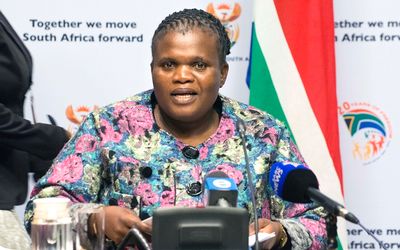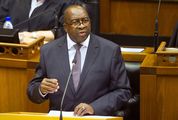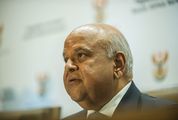Muthambi an intimation of SA prospects after Zuma
by Sam Mkokeli,
2015-11-23 05:49:54.0
I HAD the pleasure of spending time with Communications Minister Faith Muthambi during the mid-term conference of the African National Congress (ANC) last month. I sat next to her as President Jacob Zuma was delivering his closing address, punching notes into my laptop. At one stage, the minister said: "Wow, I’m impressed with your skill," referring to my touch-typing.
After a few moments of wondering how to respond to this awkward compliment, I grinned, and said, "Thank you, minister."
I interviewed her shortly afterwards — a conversation that lasted a minute and 16 seconds. It seems I spoiled the interview by mentioning Hlaudi Motsoeneng, the force of destruction at the SABC.
The minister suddenly went deaf, mouthing at least three times: "What is it?". I got even closer, almost leaning on her shoulder to shout into her ear. Still, she replied: "I can’t hear you," so I gave up and walked away.
At 40, Muthambi is the youngest member of Zuma’s Cabinet, and one of the worst. That such a visibly undercooked person could rise to Cabinet level serves only to fuel stereotypes about the incompetence of women and black people in general. This remains one of the main problems under the modern-day ANC, which frowns on black excellence while mediocrity is rewarded.
Muthambi is not alone in this category of people who are just not ready for jobs at their level. You find lots of them in Parliament, where chuckling from the podium has all of a sudden become revolutionary.
This is just an example of the problems future leaders of the ANC will have to deal with if they are to succeed in cleaning up the mess by rebranding the party and its government.
Knocking the ANC into shape so it can run an efficient government has to be one of the priorities, so that the nation can be given hope once again that the promise of economic prosperity is attainable.
Right now, indications are that we are going south while the captain is giggling, if he is not having the kind of dramatic public meltdown that saw him declare two weeks ago that he puts his party before the country.
At about 3.15pm on Thursday, the news came through that the South African Reserve Bank’s monetary policy committee had decided to hike interest rates while revising economic growth forecasts downwards.
Zuma — the man who unashamedly moonlights as our executive president (he calls himself a state president, which is a more junior position) — was on the podium in the National Assembly demonstrating his understanding of international politics at that moment, before going back to his first love: giggling.
As this happened, a German diplomat was watching from the gallery, and a few rows behind him a banker cut a forlorn figure. On the other side of the gallery, a representative of the British Consulate was taking notes. These are important players when it comes to managing SA’s image abroad. That’s where foreign investment comes from.
Every time Zuma giggles at inappropriate times, he misses an opportunity to tell the outside world he has a plan. Maybe he giggles because he doesn’t actually have one. It is clear that during this epoch — with Zuma at the helm and a sycophantic and largely underprepared Cabinet — the economy can never sufficiently be at the centre of the government’s programmes. Not in action and policy, sometimes not even in word and speech. But it is unfair to expect him to comprehend the situation. He was simply not prepared for the kind of leadership role required at this stage of our evolution as a nation.
Apartheid robbed him of an opportunity to study, while OR Tambo’s era recognised him as a man only good enough for intelligence operations, while his contemporaries — the likes of Johnny Makhathini and Thabo Mbeki — were being groomed for governance. Now we expect a spook to master economic management. How naïve of us!
The management of an economy like ours — highly sophisticated, but largely undeveloped — requires a large body of people with an appreciation of complicated economic concepts, not the kind that thinks touch-typing is a real skill.
Here lies the problem for Nkosazana Dlamini-Zuma or Cyril Ramaphosa — the likely candidates to replace Zuma. They are both interesting politicians and excellent diplomats, and will do well when it comes to explaining themselves and their ideas in professional circles. But the ANC’s elections do not work in that fashion. The people who "emerge" (as they say in the ANC when they mean "win") at ANC conferences are products of dysfunctional politics in which campaign managers put together line-ups (slates) made up of the most popular and not necessarily the best.
It is a largely undemocratic process that is neither bottom-up nor top-down. The eventual winners do not necessarily choose their running mates — slate crafters do, in the place of normal branch members.
A set-up like this means Dlamini-Zuma or Ramaphosa will likely have a "top six" and national executive committee that would by and large (possibly with their input) have been put together for them by the slate crafters: the so-called Premier League for Dlamini-Zuma and the Gauteng crowd for Ramaphosa. And their Cabinet should largely come from that crop. Unless the candidates roll up their sleeves now and get seriously involved at party level to draw smart people back into the party fold, it may well be too late after the 2017 conference to turn things around.
The real risk is that whoever wins the coming leadership race will inherit what one wise man once called "lifeless bones".
• Mkokeli is Associate Editor. Songezo Zibi will be back next week

Faith Muthambi. Picture: TREVOR SAMSON
I HAD the pleasure of spending time with Communications Minister Faith Muthambi during the mid-term conference of the African National Congress (ANC) last month. I sat next to her as President Jacob Zuma was delivering his closing address, punching notes into my laptop. At one stage, the minister said: "Wow, I’m impressed with your skill," referring to my touch-typing.
After a few moments of wondering how to respond to this awkward compliment, I grinned, and said, "Thank you, minister."
I interviewed her shortly afterwards — a conversation that lasted a minute and 16 seconds. It seems I spoiled the interview by mentioning Hlaudi Motsoeneng, the force of destruction at the SABC.
The minister suddenly went deaf, mouthing at least three times: "What is it?". I got even closer, almost leaning on her shoulder to shout into her ear. Still, she replied: "I can’t hear you," so I gave up and walked away.
At 40, Muthambi is the youngest member of Zuma’s Cabinet, and one of the worst. That such a visibly undercooked person could rise to Cabinet level serves only to fuel stereotypes about the incompetence of women and black people in general. This remains one of the main problems under the modern-day ANC, which frowns on black excellence while mediocrity is rewarded.
Muthambi is not alone in this category of people who are just not ready for jobs at their level. You find lots of them in Parliament, where chuckling from the podium has all of a sudden become revolutionary.
This is just an example of the problems future leaders of the ANC will have to deal with if they are to succeed in cleaning up the mess by rebranding the party and its government.
Knocking the ANC into shape so it can run an efficient government has to be one of the priorities, so that the nation can be given hope once again that the promise of economic prosperity is attainable.
Right now, indications are that we are going south while the captain is giggling, if he is not having the kind of dramatic public meltdown that saw him declare two weeks ago that he puts his party before the country.
At about 3.15pm on Thursday, the news came through that the South African Reserve Bank’s monetary policy committee had decided to hike interest rates while revising economic growth forecasts downwards.
Zuma — the man who unashamedly moonlights as our executive president (he calls himself a state president, which is a more junior position) — was on the podium in the National Assembly demonstrating his understanding of international politics at that moment, before going back to his first love: giggling.
As this happened, a German diplomat was watching from the gallery, and a few rows behind him a banker cut a forlorn figure. On the other side of the gallery, a representative of the British Consulate was taking notes. These are important players when it comes to managing SA’s image abroad. That’s where foreign investment comes from.
Every time Zuma giggles at inappropriate times, he misses an opportunity to tell the outside world he has a plan. Maybe he giggles because he doesn’t actually have one. It is clear that during this epoch — with Zuma at the helm and a sycophantic and largely underprepared Cabinet — the economy can never sufficiently be at the centre of the government’s programmes. Not in action and policy, sometimes not even in word and speech. But it is unfair to expect him to comprehend the situation. He was simply not prepared for the kind of leadership role required at this stage of our evolution as a nation.
Apartheid robbed him of an opportunity to study, while OR Tambo’s era recognised him as a man only good enough for intelligence operations, while his contemporaries — the likes of Johnny Makhathini and Thabo Mbeki — were being groomed for governance. Now we expect a spook to master economic management. How naïve of us!
The management of an economy like ours — highly sophisticated, but largely undeveloped — requires a large body of people with an appreciation of complicated economic concepts, not the kind that thinks touch-typing is a real skill.
Here lies the problem for Nkosazana Dlamini-Zuma or Cyril Ramaphosa — the likely candidates to replace Zuma. They are both interesting politicians and excellent diplomats, and will do well when it comes to explaining themselves and their ideas in professional circles. But the ANC’s elections do not work in that fashion. The people who "emerge" (as they say in the ANC when they mean "win") at ANC conferences are products of dysfunctional politics in which campaign managers put together line-ups (slates) made up of the most popular and not necessarily the best.
It is a largely undemocratic process that is neither bottom-up nor top-down. The eventual winners do not necessarily choose their running mates — slate crafters do, in the place of normal branch members.
A set-up like this means Dlamini-Zuma or Ramaphosa will likely have a "top six" and national executive committee that would by and large (possibly with their input) have been put together for them by the slate crafters: the so-called Premier League for Dlamini-Zuma and the Gauteng crowd for Ramaphosa. And their Cabinet should largely come from that crop. Unless the candidates roll up their sleeves now and get seriously involved at party level to draw smart people back into the party fold, it may well be too late after the 2017 conference to turn things around.
The real risk is that whoever wins the coming leadership race will inherit what one wise man once called "lifeless bones".
• Mkokeli is Associate Editor. Songezo Zibi will be back next week


























Change: 0.90%
Change: 0.73%
Change: 2.97%
Change: 0.96%
Change: -1.95%
Data supplied by Profile Data
Change: 0.00%
Change: 0.00%
Change: 0.90%
Change: 0.00%
Change: 0.00%
Data supplied by Profile Data
Change: 0.03%
Change: 0.01%
Change: -0.01%
Change: 0.00%
Change: -0.58%
Data supplied by Profile Data
Change: 0.00%
Change: 0.00%
Change: 0.00%
Change: 0.00%
Change: 0.00%
Data supplied by Profile Data